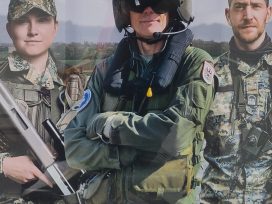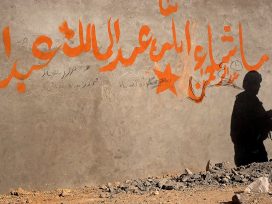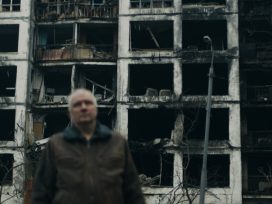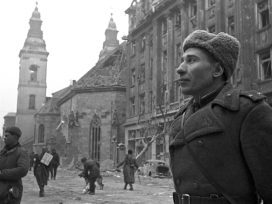The Russian question
If the collective sacrifice during the Second World War cemented Russian identity in the absence of consensus, then the attack on Ukraine does the same but to a different end. The new ‘we’ feels inescapable, whether one supports Putin or opposes him. A leading Russian poet reflects on guilt and responsibility.
Almost all the check-in desks at Moscow’s Vnukovo airport were closed by mid-March last year – but there was a long queue at the one working desk, where passengers were being checked in for Istanbul. While I waited I counted the many pet carriers: dogs, cats, even a few birds – their owners were clearly planning lengthy trips. I passed through border control and went in search of a smoking area. I found a little booth; it was such a narrow, tight space it could have been a dog kennel. There was already a man inside smoking and there was hardly room for the two of us. He offered me a light and asked, ‘so where are you fleeing from?’
He himself was fleeing from near Donetsk, a Ukrainian travelling via Moscow to England where he had a son. ‘Put the wind up you, didn’t we?’ he said to me in Russian. ‘We’re beating you and we’ll keep going, just you see.’
I wasn’t fleeing, but falling, or that’s how it seemed to me. I was moving in space and the ground was suddenly no longer beneath me. My own journey had been planned long before, and had a very definite purpose, but for some peculiar reason these purposeful plans had quite outlived all the laws of physics.
The war, begun by Russia, had deprived life of all its connective tissue: nothing happening outside Ukraine held any meaning or had any weight. The centre of life had shifted and was now there, where bombs fell on Kyiv and Kharkiv – and yet we continued to make inert movements, to twitch, as if the world around us still existed. But everything had changed. People had stopped sleeping. The green lights of social networks burnt long into the night and again in the early morning, and you could exchange comments (news threads, telegram channels, the names of towns and villages, the number of victims) all day and all night, because no one was thinking about anything else. Putin was only spoken of as ‘he’, and everyone understood perfectly, just as in Harry Potter Voldemort is rarely mentioned by name.

St Petersburg December 2022. Source: Wikimedia Commons
On Facebook, friends described how they woke up and for a moment or two it was if nothing had happened – and then it ‘descended’ on them; or they wrote about how they couldn’t sleep at all. Some people carried on posting as usual, writing about themselves and whatever lay within the small radius of their life. But with the outbreak of war, this life had been devalued and meant almost nothing, and even writing about it had become meaningless. One’s own self-worth, self-respect, the a priori belief that one could express an opinion and be heard: all these tender and natural signs of life withered, died back, were scattered. My country was causing pain and death in another country, and only Ukraine, rescuing its elderly, its children, its dogs, was a place of life, a place where people fought for life and saved it. And it followed therefore that ‘we’ were a place of death, a place exuding death, from where death spread like a contagion – and this was an unfamiliar thought.
We had, after all, grown up in a land where the narrative that united all its inhabitants was not the building of communism, but the knowledge that we had prevailed in a terrible war – and that preventing another such war was all that mattered. Our collective ‘we’ regarded itself through the memory-lens of huge suffering and the just-as-huge effort needed for victory. This collective self was to a large degree constructed on the memory of a sacrifice which bound us all together. In Putin’s Russia the sole point of consensus on the historical past was that we had been victorious in the Second World War. Everything else – Ivan the Terrible and Stalin, Peter the Great and Lenin, the Revolution in 1917 and the collapse of the Soviet Union, the Terror of 1937 and the reforms of the 1990s – has remained a matter of controversy. As time passes this controversy has only become more heated, a civil war of the memory – brother fighting brother and no one able to agree on anything.
An absence of collective memory, or even of a view of our own history that is shared by the majority, is one of the features of Russian reality, and it has been like this for decades. Almost the only area where history feels shared, a collective lived experience, is the victory of the Second World War, as well as the still-unhealed wound this war inflicted on the physical body of the country, and the sense of a special, almost sacred significance given to both the conflict and its victory. And of course it unites us exactly because of the rare and precious feeling that, in this small corner of Russian history at least, the suffering and death of millions was not in vain, it was not unfathomable or meaningless, nor a sacrifice to the inscrutable gods of revolution or empire. That suffering was essential to save us, and the rest of the world, from desperate evil.
So, for a brief moment, even the executioners and victims of the recent past were suddenly united and part of the collective, on the side of the good, the winning side. We had been attacked and we were defending ourselves. Without us no victory would have been possible, and that alone was enough to guarantee long years of belief in our virtuous qualities.
I’ll note here what has been said many times before: that this belief in our own virtuousness, in our victory over evil, and our distance from this evil, has not the least basis in historical reality. The Molotov-Ribbentrop Pact of 1939, the occupation of Poland and the Baltics, the Vlasov Movement, the use of anti-retreat troops to shoot anyone thought to be retreated or deserting, the Yalta division of Europe – none of this enters the collective consciousness. Memory is distinct from history in that it ignores facts in the name of affect: the Second World War, named the Great Patriotic War in the USSR, was the only example of affect that survived as a universal for generations of postwar Soviet citizens.
If that war shored up a collective identity, whatever it might have consisted of, then of course this war serves the same function, but to a different and terrible end: we are not defending ourselves, we are the aggressors and we are doing exactly what was done to us: invading foreign territory, bombing communities while they sleep, occupying peaceful towns and villages. We have become those very same forces of evil that we read about in our textbooks and in the stories about child heroes, and (unbearable to admit this because there is nothing to differentiate us) the violence of these months took root in Russia and spread out from there, and if I can’t stop it, then I am a part of it. Helplessly so, but still one part of those responsible.
*
Supporters of Putin, and those who spent years doing everything they could to oppose him, are now indistinguishable in a darkness that emanates only threat. There is no longer any significant difference between Russia and Russians; between the country with its borders and physical features, and the Russian state; between those who live there now and those who lived there once; between the Russian language and its speakers; between the ones who left and the ones who remain. Once those differences mattered but now everything works differently.
After all this isn’t about how the world treats Russians, but about what we ourselves are afraid of, and why we are in the grip of such fear. None of us, neither the ‘we’ who oppose Putin, nor those who support him, want to seem like ‘the baddies’, and the knowledge that this is inevitable is unbearable for both groups. The logic of war erases all detail and demands that we generalise; citizenship, language, nationality become a cement that glues mutually exclusive elements into a society, the contours of which are defined from the outside. Personal choice and biography, the nuances of political positioning, mean almost nothing. They have become merely one’s personal affair. We are frightened by ourselves, we recoil from ourselves. Even before the outside world starts to hate us, we hate ourselves.
Consider even briefly this collective ‘we’ and it is immediately clear that it has no limits. If we try to define the limits using the usual tools of citizenship or language or place of residence, it is obvious that they have no currency in the face of this catastrophe. Over the last few months I have spoken with those who have left Russia (to distance themselves from the country that could do such a thing) and with those who decided to stay (to resist the regime from inside, however dangerous that might be, to stay in one’s beloved country and not to relinquish it to those who are destroying it), I have spoken to those who left Russia twenty, thirty, forty years ago, and to those who were born in emigration – and they all form part of this constellation, even as they sometimes desperately try to insist on their separateness.
Those who say, ‘I am also to blame’, and those who maintain it has nothing to do with them, are equally connected with the existence of the new ‘we’, and if there is no clear shape to it, there is the collective knowledge that we are inside a new reality, as yet without its own lexicon. This new reality asserts its presence as a violence against an accepted system of relationships and assumptions recognised by the world. The changes brought about by war make a chasm between what you knew about yourself, and how you will understand and describe yourself from now onwards. After Bucha and Mariupol our individual histories have been thrown together into a common sack, and will be perceived in a common light: Russians, however they describe themselves, carriers of Russian culture, or speakers of the Russian language, living inside and outside Russia, all belong to the single grouping of ‘those people who did this thing’ – and it is from here that we must now search for our place and its meaning.
You might say that this is only how it appears to the onlooker, and from within everything is more complicated (as each specific consciousness attempts to define itself from inside the catastrophe as it unfolds). And perhaps this is so. But it is the external gaze, estranged and unreceptive to the appeal of the subjective self, that now defines us, and it is harder and harder to be reconciled to the fact that this gaze has become one’s own. You see yourself in the mirror and you don’t recognise yourself: is that person really me? And what follows: can my mother really have loved such a creature?
The strangest thing is that the fear of this external gaze, which we feel on our skins like a brand, is shared by those who support the war, who call it a ‘special operation’, a measure of self-defence, or whatever else they find to say. I overheard a conversation on a plane recently, an elegant woman dressed in black was complaining in Russian that her credit cards no longer worked, adding, with suppressed hatred, ‘because of those bastards’. I wondered whether she meant Putin and his state machine, or the world’s community and its sanctions (and, by extension, me, as I support these sanctions). A refusal to accept responsibility is the last refuge of the person who has been knocked clean out of the life they thought to be their own and forced to contemplate their own helplessness (like those who woke up on 24 February in Kyiv and Kharkiv? This comparison cannot be justified as it was not us being bombed, it was us dropping the bombs).
‘It wasn’t us who started this, it was Putin, we had nothing to do with it,’ say some. Others maintain they are not to blame: ‘it’s the western politicians, NATO, “Nazis”, Ukrainian statehood, capitalism…’ And the picture becomes so cluttered with those others who must be held responsible it becomes harder and harder to find oneself – like in a children’s book where you have to spot the tiny butterfly or bird in a huge pile of leaves, or a sailboat in a sandpit.
An overall sense of falling, falling without end, without time, touches everyone I’ve spoken to over these eternal months. ‘Falling’ is a good term as it can be understood in different ways – as a descent into the abyss, or the falling away of the moral contract which binds a society together, falling out of the frame of civilisation, falling from the human nest. This feeling unites all of us (without necessarily bringing us closer) who believe this war to be evil, and who believe ourselves to be carrying the stigma of an indefinable connection with this evil. For the outside world this connection is now called ‘being Russian’, and for those who are connected with Russia by means of a birth certificate or a residency permit, or language, family tradition, love, hate, a long memory, sometimes just a surname from a grandparent – for them it has no name. It just hurts. That is in fact how it feels: you know yourself to be at blame, because of the pain you cannot hide, or confuse with anything else.
*
Should we attempt to decide whether to call this responsibility or guilt, in the manner of Simone Weil and Hannah Arendt, and try to disentangle the relationship between the personal and the collective? Once again, resolving all this will take years. And the process can only begin when the war ends, and it looks as if that won’t happen soon. So perhaps now is the time to think, not about our various differences, but rather what we must do right now.
It feels indecent to focus on oneself in this moment of confusion and disarray, so I will endeavour not to write at length. I was born in 1972, only thirty years after the Second World War. The same thirty years separates the collapse of the USSR (‘almost bloodless’ as people used to say) from the invasion of Ukraine. War was everywhere, even in the songs my mother sang to me before I went to sleep: about warships on a raid, or a shot resounding, and another lying dead in the tall steppe grass. In my Russian-Jewish family (mostly Jewish apart from my paternal grandfather who gave me my surname, Stepanov) we never spoke about our Russianness, there was no reason to discuss it and nothing to say.
But my parents well understood their Jewishness – it was dangerous and a source of pain, but also a source of love; it was incredibly important somehow, although what it consisted of, and how it separated me from others, I was quite unable to understand. I couldn’t feel a sense of separateness inside me, but outside me it seemed others saw and knew it. Jewishness was not a characteristic, but rather a condition of existence, and life had to be lived in accordance with it. If I was ever asked what I was, then I answered that I was Jewish.
Sometimes I am asked how I should be introduced: as a Russian writer, a Russian-Jewish writer or a Jewish writer? I was once used to saying that it didn’t matter, do as you will – thinking at the same time that I didn’t feel like a Russian writer or a Jewish one, and definitely not a representative of Russian letters, with its mass publications and trade fairs. I liked to imagine that I represented only myself, and carried only the responsibility for being myself. This feeling lasted for so long that I had almost forgotten exactly where and how the question of nationality hurts. Then it began to change, quietly, without me hardly noticing, until on 24 February 2022 it disappeared forever. Now there is no question: when I am asked, I say I am a Russian writer.
I often think how a month or a year ago I could have been in a tram or a metro carriage with someone who is now fighting in Ukraine and murdering innocent people. We, they and I, formed and still form a collective ‘we’, however appalling that thought is. The collective ‘we’ of brief encounters in public space, town square or transport – and the ‘we’ of a shared language, which, it seems, doesn’t stop us killing each other. This ‘we’ is made of millions of incompatible fates and strategies, which mean nothing in the face of collective guilt, shared misfortune, a shared catastrophe. It is a torment to belong here, but perhaps it is the only thing that makes any sense right now.
The evil that has been done must be repaired, the place from which that evil comes must once again be made fit for humans; the language with which it speaks must change. The stigma, the burning wound of collective complicity may yet be a starting point, the beginning of a path from this blind ‘we’ to a society of seeing ‘I’s. And this can only be achieved from within.
Published 22 February 2023
Original in Russian
Translated by
Sasha Dugdale
First published by Frankfurter Allgemeine Zeitung 23 January 2023 (German translation); Eurozine (English translation)
© Maria Stepanova / Eurozine
PDF/PRINTIn collaboration with
In focal points
Newsletter
Subscribe to know what’s worth thinking about.
Related Articles

Talk of demilitarization and mobilization divides opinion. Could giving women and other feminized groups more agency in wartime decision-making flip their traditionally passive role, providing relief from trauma and injustice?

From Bosnia to Afghanistan, the neoliberal peace-building model has compounded conflicts and inequalities by eroding the core function of states. But in Ukraine, the co-optation of the recovery process by private economic interests is being taken to a whole new level.






